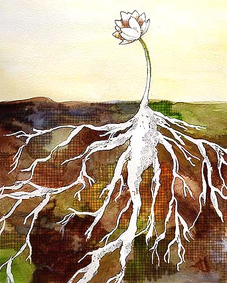
Spiritual Roots
Each soul has its own spiritual root, task, and tikkun in the world. For that reason, there's no purpose in judging ourselves by comparing ourselves with others.

Translated by Rabbi Lazer Brody
The Tale of the Lost Princess Final Part 37 from The Garden of Yearning
…and entered the city. And it was a beautiful city. He approached a man, and rented lodgings, for he would need to stay there some time. For it would need much cunning and wisdom to free her…
Again, we see just how much patience we need in redeeming emuna. Even now – after the viceroy has attained lofty spiritual levels and traversed a myriad of obstacles – he has reached the place where he can free the princess, but he still must wait. The task of waiting is a lofty spiritual task, required at every rung of the spiritual ladder. Mistakes and blemishes come from haste and impatience, like picking unripe fruit: Today, it’s sour. But if one waits for the right time a few days later, the same fruit will be delightfully sweet. Even great tzaddikim have made the mistake – relative to their lofty spiritual status, of course – of trying to hasten the premature. Hashem has His own time table of salvations.
Hashem alone did, does, and will do every action in the universe. Our task is simply to desire to fulfill Hashem’s will, and to yearn with pangs of longing for the moment when we can do His bidding. When the right time comes, Hashem helps a person to successfully complete his task and to merit a fulfilling life of Torah, mitzvot, and good deeds.
And how he freed her, he did not tell, but in the end he freed her…
 Rebbe Nachman didn’t reveal how the viceroy freed the princess, for it’s impossible to tell – this is a personal story that varies from person to person. Each one of us has to rescue his or her own personal princess – emuna – and reveal emuna to the world. Each person has his or her own way of accomplishing this task, and one person can’t imitate another’s method, for each soul has its own mission and mode of operation. There’s no connection at all between one person’s way of serving Hashem and another person’s.
Rebbe Nachman didn’t reveal how the viceroy freed the princess, for it’s impossible to tell – this is a personal story that varies from person to person. Each one of us has to rescue his or her own personal princess – emuna – and reveal emuna to the world. Each person has his or her own way of accomplishing this task, and one person can’t imitate another’s method, for each soul has its own mission and mode of operation. There’s no connection at all between one person’s way of serving Hashem and another person’s.For that reason, it’s senseless to look at other people. Each of us is a unique individual with a unique task that no one else can do. Rebbe Nachman elaborates on the passage in Ezekiel, Chapter 33, that states, “Abraham was one.” Abraham served Hashem as if he were the only person in the world, and therefore ignored all the idolaters all around him.
Just as every individual has a separate genetic map, each soul has its own spiritual root, task, and tikkun in the world. For that reason, there’s no purpose in judging ourselves by comparing ourselves with others. For example, if one person learns four hours of Gemara in one sitting, but another person’s attention span, especially for Gemara, is half an hour, that doesn’t mean that the latter is inferior, Heaven forbid. It could be that he has already corrected what he needed to correct in the area of Talmudic study in a previous reincarnation, while during this life, his mission is totally different. No one expects a fisherman to fly a jet aircraft. Conversely, a jet pilot can’t sell you a fish for your Shabbat meal. Each of us has his or her own vital mission. Therefore, we should concentrate on performing our task with joy and innocence no matter how Hashem runs our lives without comparing ourselves to anyone else, for Hashem leads each of us down the path that is conducive to our own individual tikkun.
Confession
The only way to find our unique path in life and in the service of Hashem – without confusion and without becoming discouraged from looking at and listening to others – is to spend an hour a day in hitbodedut, personal prayer and self-evaluation. Rebbe Nachman explains (see Likutei Moharan I: 4), that when a person confesses daily, then the true tzaddik helps pave the way to a true correction of the soul according to that individual’s needs. When Rebbe Nachman was alive, his disciples would confess to him personally. Now that Rebbe Nachman is no longer in the flesh, we confess in our personal prayer to Hashem, and we maintain our bond with our teacher and spiritual guide – Rebbe Nachman – by fulfilling his directives and advice as brought down in his writings. When we do so, Rebbe Nachman intervenes on our behalf in the upper worlds, and from his sphere of influence there – unlimited by physical boundaries and restraints – and helps each of us that is bound to him. The Gemara teaches us that the true tzaddik never dies, and can do much more after his life in the material world than he can during his physical existence.
In addition, hitbodedut is the only thing in the service of Hashem that is truly personal. All other mitzvot are mostly standard and uniform: Everyone wears tefillin, everyone learns Torah, and everyone observes the Sabbath. Everyone even prays from the same prescribed prayers.
Only hitbodedut is totally individual; there are no ironclad laws and no standard format. Each person pours his heart out to Hashem according to his current state of mind and body. This is the place to emphasize and warn that no one must hear what we say to Hashem. If someone has the urge to yell or cry out, he or she must be absolutely certain that no one else is within earshot. One can also cry out in silence, from the depths of the heart. Such a silent scream can’t even be heard by the person sitting next to you on the train or plane.
Therefore, our holy Rebbe didn’t tell us how the viceroy freed the princess, for the way to free the princess is by way of hitbodedut, which varies from person to person. If someone truly yearns for emuna and to rescue his own personal princess, then he should devote an hour a day to hitbodedut, no matter what.
Thoughts of Repentance
Now, we can readily understand what our holy Rebbe Nachman said in the introduction: “Along the way, I told a tale, that everyone who heard it had thoughts of repentance…”
When a person merits hearing this poignant tale of the lost princess, and sees the viceroy’s dedication in finding and freeing her, the perseverance, conviction, commitment, yearning, and triumph over all obstacles and setbacks – even when the princess becomes more elusive – he or she is aroused with a desire for teshuva, for getting closer to Hashem. The road to teshuva is strewn with obstacles, barriers, setbacks, highs and lows, successes and failures. Likewise, when we walk the path of teshuva with the same courage and conviction that the viceroy exhibited in the performance of his challenging task, we’re assured ultimate success. The important thing is to constantly fuel the desire and yearning for holiness at all costs, forever continuing our personal search for true emuna.
This is the thought of repentance – arousing the strong desire to walk in the path of teshuva, no matter what, saying in our hearts, “I want to make teshuva! I’ll never abandon my desire to get close to Hashem!
Completed with Hashem’s loving grace, may His Holy Name be praised forever and ever.













Tell us what you think!
Thank you for your comment!
It will be published after approval by the Editor.